|
Locks and keys have had a strange
fascination for many people through long ages. In some form
or other they have been used almost from the earliest days
of mankind; and the history of their gradual development
forms a fascinating study.
|
|
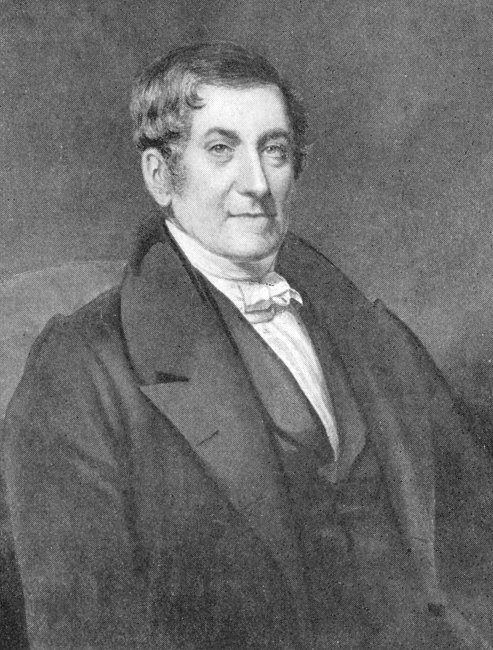
Mr. Charles Chubb, founder of the
firm. Born in 1772, died in 1846. |
The story of the 100 years of Chubb's
lock which was patented by Jeremiah Chubb on February 3rd,
1818, cannot be properly told without recalling some facts
relating to the growth, from old times, of methods adopted
by our ancestors for securing their own property and
sometimes the property of others. The improvement in locks
claimed by Jeremiah Chubb in the specification of the
original Chubb patent, was the introduction of a detecting
mechanism, the detector consisting of a lever moving on a
fixed centre pin, and so placed as to be operated on by the
tumblers or levers of the lock.
When the levers are raised to their correct height by the
use of the proper key supplied with the lock, the bolt is
duly thrown and the lock secured.
But if any attempt is made, either carelessly or by
design, to open the lock by means of any but its correct
key, the levers are lifted above or below their assigned
height; the detector then comes into action and effectually
stops the motion of the bolt, detecting the lock and
rendering it temporarily useless. |
| To quote the words of Mr. Chubb's specification: "
In this state the lock is what I call detected, and the
possessor of the true key has evidence that an attempt has
been made to violate the lock, because the true key will not
now open it, for neither the true key nor tumblers have any
means of communication with the detector after it has passed
the point of detection." |
|
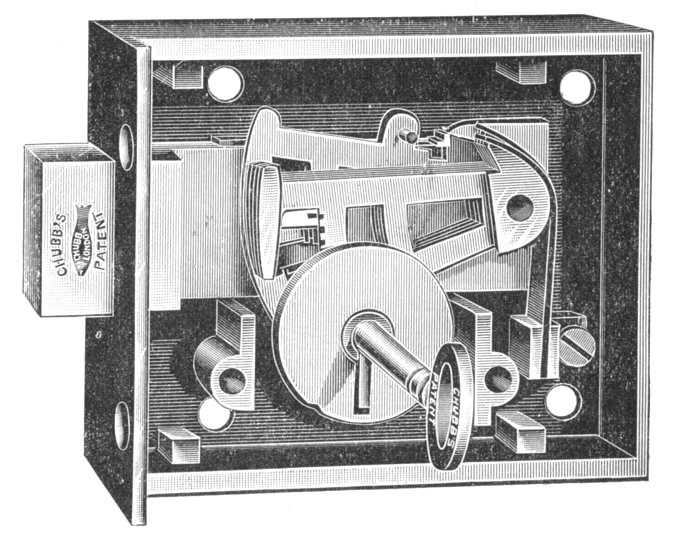
The Chubb Detector Lock. |
|
The owner, however, is able to overcome
this state of things by the use of a regulating key provided
by the maker, which restores the lock to such a state of
adjustment that the original key will open it.
By the subsequent improvements devised
and patented in 1824 by Jeremiah Chubb's brother Charles,
this special adjusting key was rendered superfluous by a
device which allowed of the key by which the lock was
actuated, being also capable of counteracting the
"detection"; and, with modifications, this principle
introduced by Charles Chubb survives today.
The number of
lock patents granted to Chubb's since 1824 is very large,
many of the improvements being of considerable technical
interest, but such details are out of the scope of this
work.
|
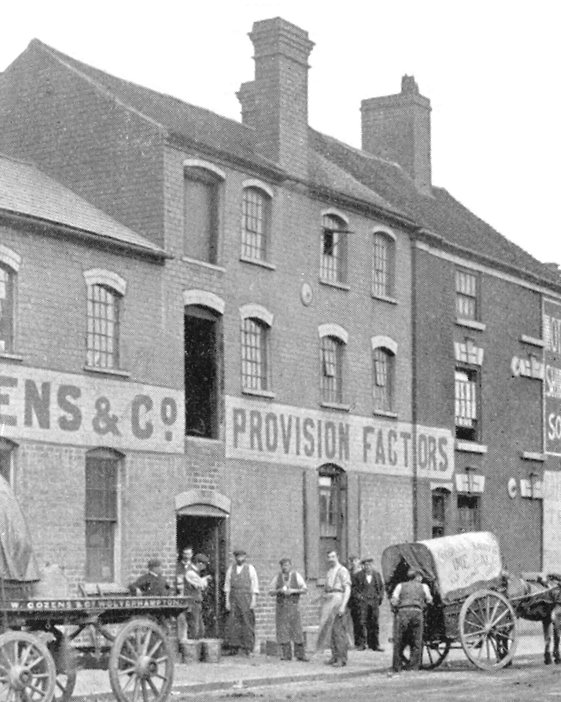
The original Wolverhampton lock
works of Messrs. Chubb and Son, used by them up to about
1840. |
|
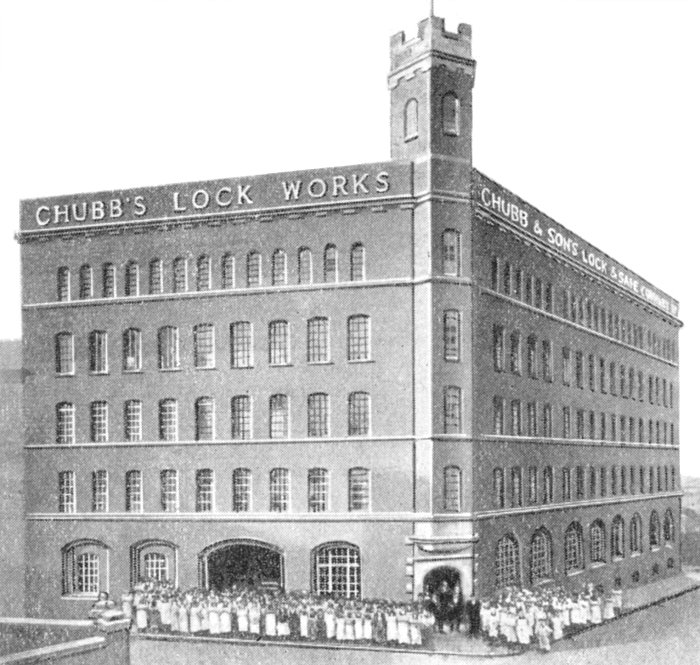
Chubb's present Wolverhampton Lock
Works, opened in 1899. |
|
Small Beginnings
The first Chubb locks were made in a
small workshop in Portsea, Hampshire, but their manufacture
was quickly transferred to the great lock making centre of
Wolverhampton, with which locality the house of Chubb has
since been so prominently associated. Our illustrations of
the original and the present Chubb Lock Works offer
convincing indication of the expansion of the business.
|
|
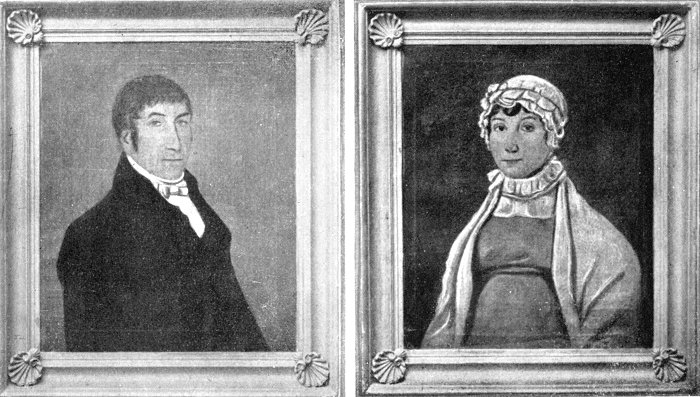
Mr. and Mrs. Charles Chubb. |
| The connection of Wolverhampton with
the lock industry is an ancient one, and in an introduction
to "Abridgments of Lock Patent Specifications" published in
1873 we read: "The manufacture of locks was introduced into
South Staffordshire as early as the reign of Queen
Elizabeth, but it did not flourish as one of the chief
staple industries of the district until the end of the
seventeenth century. Dr. Plott, writing A.D. 1686, says of
Wolverhampton: 'The greatest excellency of the blacksmith's
profession in this country lies in their making of locks for
doors, wherein the artisans of Wolverhampton seem to be
preferred to all others, making them in suites, six, eight,
or more in a suite, according as the chapman bespeaks them,
whereof the keys shall neither of them open the other's
lock, yet one master key shall open them all.'" This system
of suiting locks remains, with certain modifications, at the
present time.
Founders of the Firm
Mr. Charles Chubb, who was born at
Fordingbridge, Hampshire, in 1773, was associated during the
early years of the last century with his brother Jeremiah
Chubb in business at Portsmouth as a ship's outfitter and
ironmonger. Both brothers necessarily were acquainted with
hardware, and no doubt frequently dealt with the common
locks of the period. |
|
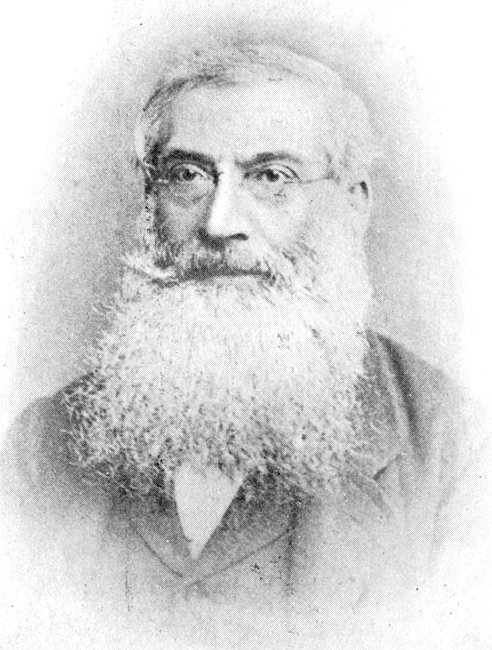
Mr. John Chubb, son of Charles
Chubb. Born in 1815, died in 1872. |
In the year 1817 a serious robbery, accomplished by
the aid of false keys, took place in the Portsmouth
dockyard, and a reward of £100 was offered by the
Government for a lock which could not be opened by any
other than its own key.
It is recorded that a convict on board one
of the prison ships at Portsmouth dockyard, who was by
profession a lock maker, and who had been employed in London
in making and repairing locks for several years, and
subsequently had been notorious for picking locks, asserted
that he had picked with ease some of the best locks, and
that he could pick Chubb's locks with equal facility.
One of
the latter was secured by the seals of the late Sir George
Grey, the Commissioner, and some of the principal officers
of the dockyard, and given to the convict, together with
files, and all the tools he stated to be necessary for
preparing false instruments for the purpose; as also blank
keys to fit the pin of the lock; and a lock exactly the same
in principle, so that he might examine it and make himself
master of its construction. |
| Promises of a reward of £100
from Mr. Chubb, and of a free pardon were also made to him
in the event of his success. After trying for two or three months to
pick the sealed lock, during which time, by his repeated
efforts, he repeatedly overlifted the detector, which was as
often undetected or readjusted for his subsequent trials, he
gave up the attempt, saying that Chubb's were the most
secure locks he had ever met with, and that it was
impossible for any man to pick, or to open them, with false
instruments.
Chubb's Detector Lock
No record can be found of the number of
other ideas submitted in the competition; but whatever their
number or character, it was the detector lock patented
February the 3rd, 1818, by Jeremiah Chubb, and greatly
improved shortly afterwards by Charles Chubb, that gained
the Government reward. |
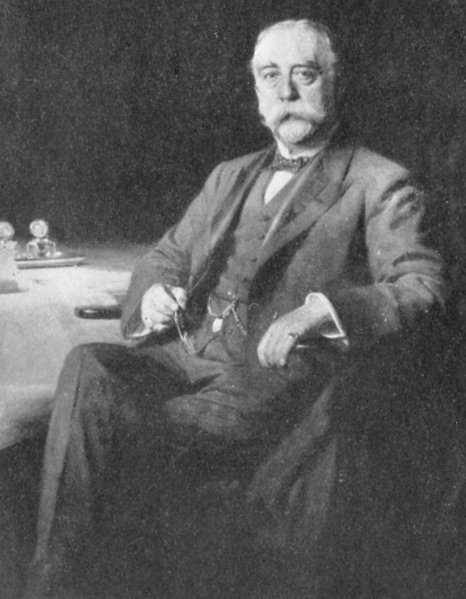
Sir George Hayter Chubb, Bt., JP. Son
of the late John Chubb, chairman of the company. |
| We further learn that in order to
ascertain the result of friction on Chubb's detector lock,
one of them was subjected to the alternate rectilinear
motion of a steam engine in the Portsmouth dockyard, and was
locked and unlocked upwards of four hundred and sixty
thousand times consecutively without any appreciable wear
being indicated by a gauge applied to the levers and the
key, both before and after this alternate action. |
|
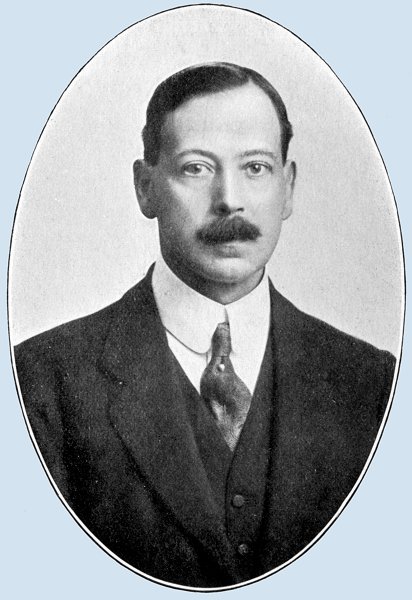
Mr. Charles Archibald Chubb. Managing
Director. |
This Chubb lock at once gained the
public approval; and after starting lockworks in a small way
at Wolverhampton, Charles Chubb soon disposed of his
hardware business at Portsmouth and moved to 57 St. Paul's
Churchyard, London, E.C., confining his trade there to the
selling of his patent locks.
Safes, strong rooms and safe
deposits were subsequently added, and since the removal to
128 Queen Victoria Street in 1877: this latter branch of the
business has grown to large dimensions.
Later on Mr. Charles Chubb's youngest
son, John, became associated with him in business, and a
small factory for the manufacture of safes was opened in
Smithfield, London.
Mr. Charles Chubb died in 1846, and for
some years his son, Mr. John Chubb, was the sole owner of
the business, until in 1863, his son John Charles worked
with him, and in 1865 his second son, George Hayter, now the
chairman of the Company, joined them in the conduct of the
business.
|
| In 1866 a new safe factory was built in
Glengall Road, Old Kent Road, London, S.E. By the death of
Mr. John Chubb in 1872, his two sons were at a comparatively
early age, left in the management of the business. In the
year 1882 the business was purchased from the late Mr. John
Chubb's trustees and formed into a Limited Company under the
chairmanship of Mr. George Hayter Chubb, who had associated
with him as directors, his brothers, Mr. John Charles Chubb
and Mr. Harry Withers Chubb, together with Mr. James E.
Vanner and Mr. Alexander McArthur, MP.
The four last-named
directors having passed away, they were succeeded by Mr.
Charles Archibald Chubb and Major George Herbert Chubb,
R.A., sons of Sir George Hayter Chubb, who was made a Knight
Bachelor in 1885 and created a Baronet in 1900.
Mr. John
Edward Chubb, son of the late Mr. John Charles Chubb; and
Major Harry Emory Chubb, son of the late Mr. Harry Withers
Chubb.
The other seats on the Board being filled by Alderman
Sir George Wyatt Truscott, Bart., and Sir Henry Holloway.
Recently the directorate has been further extended by the
election of Mr. Harold Gabriel Morrish. |
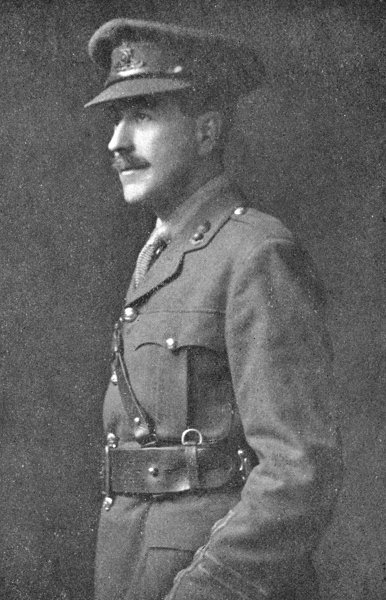
Major George Herbert Chubb, RA.
Director of Chubb's and Managing Director of Chubb and
Maxwell Limited, and Chubb's Australian Company Limited. |
|
Australia and South Africa
In 1894 a company was formed to deal
specially with Chubb's export business with South Africa,
under the style of Chubb and Maxwell, Ltd., being locally
directed by the late Mr. Robert George Maxwell, and in 1896
a further subsidiary company was founded for Australian
business, called Chubb's Australian Co., Ltd., under the
management of the late Mr. Oswald H. M. Pain; both Companies
having Major George Herbert Chubb as London Managing
Director, and. Mr. H. G. Chalk, Secretary of the parent
Company, as Secretary.
At the present time, owing to the
deaths of the original managers, the local representation of
the companies is in the hands of Mr. Ernest J. Hartley in
South Africa and Mr. Christopher Langsworth in Australia.
Chubb's Indian interests in Bombay have
been successively controlled in past years by Mr. Eduljee
Pestonjee; Mr. Chas. E. Powell; Mr. David Laidlaw, who
joined the Colours in 1916, and fell in his country's
service in 1917; and latterly by Mr. J. Henshilwood.
|
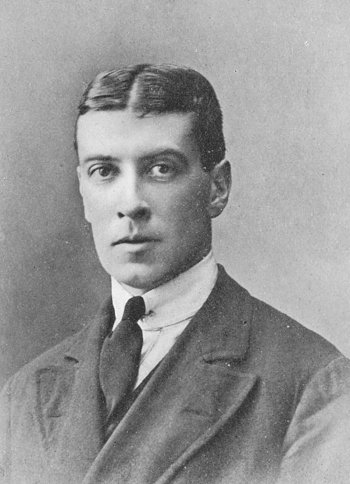 |
|
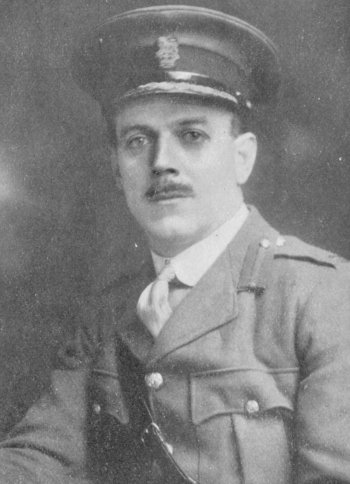 |
| Mr. J.
Edward Chubb. Resident Managing Director at
Wolverhampton. |
|
Major H. Emory Chubb. Managing Director.
|
|
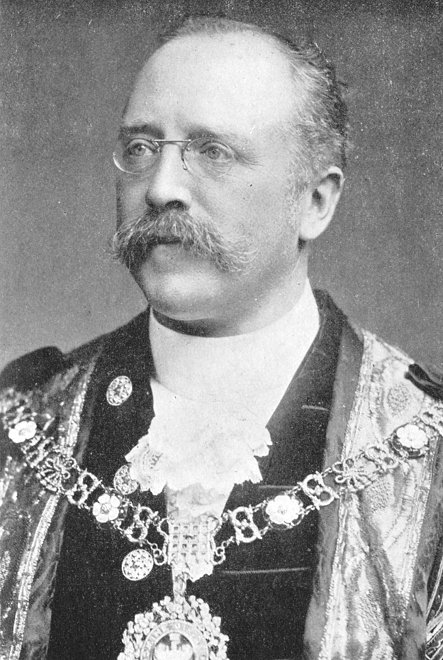
Alderman Sir George Wyatt
Truscott, Bt, JP. Company Director. Lord Mayor of
London, 1908 to 1909. |
New Premises
In 1908 Chubb's safe works situated in
the south of London were sold, as at that time the
desirability of concentrating all manufacturing operations
under central control became increasingly apparent, and in
addition to extensions for safe making being provided at the
large Wolverhampton Lock Works, new and extensive buildings
for the manufacture of safes, strong room doors, treasuries,
strong rooms and safe deposits were erected on a ten-acre
site at Wednesfield Road, near the Lock Works, the premises
comprising erecting shops for steel construction on a large
scale, machine shops, stores, offices, workers' canteens,
and all other accommodation for meeting the present and
anticipating the future needs of an expanding business.
The whole of the works were thus
concentrated at Wolverhampton under the control of a
resident managing director and works managers formerly
connected with the London works.
Various considerations influenced
the concentration of Chubb's Works at Wolverhampton. It
is a great centre of the hardware and metal trades: it
offered better and healthier housing facilities for the
workers, having an excellent garden city in close
proximity to the new works site: while rents and rates
were lower than in London, a fact which weighed
favourably with both employers and employed.
|
| Many of the men were natives of the Staffordshire
town, who had settled in London, and were, in many
cases, not averse to returning to Wolverhampton. The
wisdom of making Wolverhampton the manufacturing
headquarters of the company has since been amply proved. In a letter dated May 13th, 1818,
written by Jeremiah Chubb shortly after his settlement at
Wolverhampton, he said: "My lot will be fixed here, as I do
not expect to be so useful anywhere as in the manufactory."
During the intervening century an unbroken connection has
existed between the descendants of the writer of those words
and the now flourishing Midland town, in which the old
Portsea trader commenced the manufacture of the wares with
which the name of Chubb has so wide-world an association.
In 1909 the Corporation of
Wolverhampton conferred the honour of the Freedom of the
Borough upon Sir George Hayter Chubb. In tracing the
connection of the successive members of the Chubb family
with this old business, it may not be out of place to refer
to the manner in which the good feeling existing between
them and those serving them, whether in a managerial or in a
less important position, has been demonstrated by gratifying
length of service and other evidences of mutual goodwill.
Mr. W. H. Chalk, formerly London manager and secretary to
the company, who died in 1898, was in the service for fifty
one years. He was succeeded by his son, Mr. H. G. Chalk, the
present secretary of the Company.
|
|
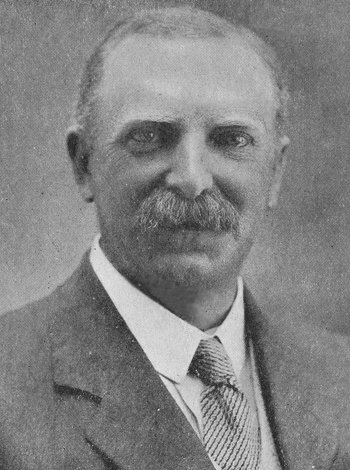
Sir Henry Holloway, JP. Director. |
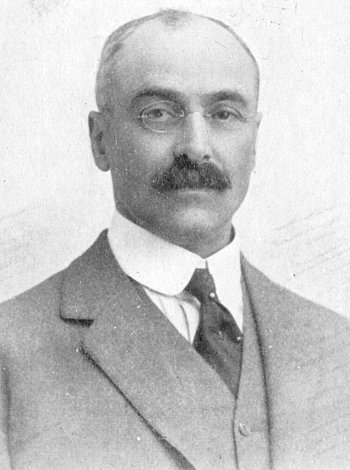
Harold G. Morrish. Director. |
|
Long Service
Mr. Ebenezer Hunter, manager at
Wolverhampton, and a prominent Municipal Councillor, who
retired in 1883 and died in 1898, had an active connection
of fifty four years with the firm. Mr. H. R. Powell, who
happily survives in good health at this date at the age of
eighty five, held the position of cashier during a large
part of his half century's service: and Mr. G. Gaskell
Exton, manager, has been with the company some thirty five
years. In certain cases the records of workmen are even more
remarkable. William Chick, foreman locksmith at the London
head office, served for sixty years before his retirement.
John Parkes, who died at Wolverhampton in 1912 after
enjoying a pension for ten years, had at the time of his
retirement completed fifty nine years' work, while Harry
Inscoe, whose portrait appears in Chapter 2 and who is still
engaged on high class lock work, completes sixty one years'
service this year (1919).
|
 |
|
 |
Return to
the contents |
|
Proceed to
Chapter 2 |
|